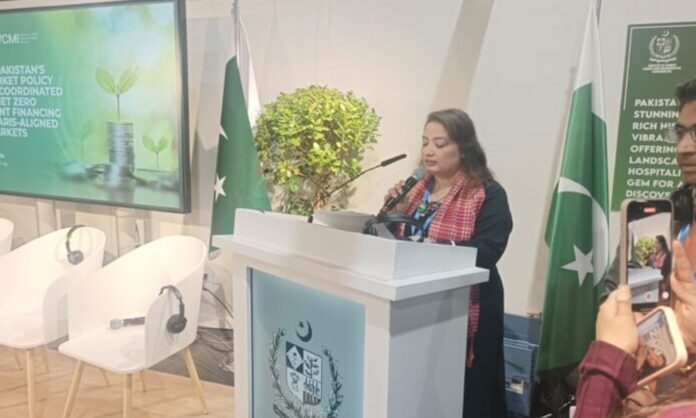BAKU: Pakistan is actively exploring the development of carbon markets as a critical strategy to meet climate goals, attract green investments, and transition to a low-carbon economy, according to Coordinator to the Prime Minister on Climate Change, Romina Khurshid Alam.
Speaking at the high-profile event Launch of Pakistan’s Carbon Market Policy during COP29 in Baku, she remarked, “Let me say this confidently that Pakistan is now ready to lead, innovate, and collaborate with the local private sector as well as international partners for the development of carbon markets to attract investments in green initiatives for achieving climate goals under the Paris climate pact.”
Carbon markets offer a platform for trading carbon credits, which represent reductions in greenhouse gas (GHG) emissions. These markets operate on “cap-and-trade” systems or credit-based mechanisms, enabling businesses to buy, sell, or offset their emissions. “By participating in such markets, Pakistan can incentivize businesses and industries to adopt cleaner technologies and practices,” Alam explained.
She emphasized the government’s commitment to making carbon markets a cornerstone of Pakistan’s climate strategy. “This launch is just the beginning. The government of Pakistan is fully committed to supporting the development of this market, ensuring it becomes a catalyst for sustainable development,” she added.
Alam highlighted the alignment of the proposed carbon market with Pakistan’s Paris Agreement commitments. The mechanism would allow the country to monetize emissions reductions while supporting adaptation and mitigation efforts in sectors like energy, agriculture, waste management, and forestry.
Inviting partners to collaborate on establishing robust carbon markets, she said, “We are ready to work with partners to make this policy not just functional but transformative.” She further noted that a transparent compliance market and voluntary carbon market would encourage private sector involvement in greenfield projects aimed at climate resilience. “The success of Pakistan’s carbon market will depend on collaboration—within our borders and across them,” she concluded.























